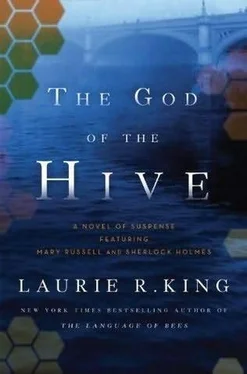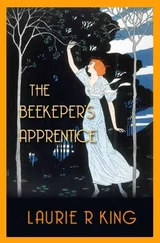“A ladder!” I withdrew my head and met Holmes’ dancing grey eyes. “Oh, surely not. Mycroft couldn’t climb those.”
“Last year’s Mycroft, no. But this year’s model?”
“Good heavens. You don’t imagine…”
“That my brother decided to shed weight in order to use this? It would require considerable determination and foresight.”
Mycroft’s Russian-doll of a mind, renovating a kitchen to conceal the noise and dust of building one secret entrance, at the same time creating another, even more closely hidden one.
Goodman had nudged me aside to look at our find. His height made it difficult to see, so he dragged Mrs Cowper’s chair over to climb on. He thrust his torso inside. In a moment, his hand came back, holding a wide metal strip with a small hook at one end.
Holmes examined it, then bent to fit the hook into the wire mounted on the portrait. “It’s a means of replacing the king before the door is fully shut,” he said.
“Where does the shaft come out?” I asked Holmes, keeping my voice low. “Is the basement kitchen still in use?”
“I believe he was interested less in the depths than what lies above.”
“What is that?”
“The Melas flat,” Holmes replied with satisfaction. Then his face changed as he lunged past me, too late for the second time in minutes.
“Goodman, stop!” he hissed, his hand locked on the Green Man’s ankle. Goodman did not retreat, nor did he reply, he merely waited, giving Holmes no choice but to let go. He thumbed the torch on and climbed through on the small man’s heels, with me bringing up the rear and praying that the boards had in fact held Mycroft’s weight, and could thus be trusted to hold a series of lesser bodies. It was at least forty feet to the ground, and I had two men above me.
The torch in Holmes’ hand bounced madly, illuminating nothing so much as the soles of Goodman’s shoes. I had only gone up a few feet when everything came to a halt. Trying simultaneously to cling to the wall and peer around Holmes, I saw Goodman’s left hand exploring the wall beside the ladder, a storey above Mycroft’s kitchen. Holmes stretched his arm back so the light fell on the wall; I heard a faint click.
Sudden light flooded the shaft, and Goodman leant forward to place his hand on the lower edge of the entrance.
Then he froze, his weight braced on one hand, suspended above our heads.
Holmes shifted, and said in a low voice, “Mycroft? If that is you, kindly put away your gun and allow Mr Goodman to enter.”
The light dimmed somewhat as a figure appeared through the hole in the shaft wall. “My dear Sherlock. And Mary, too, I see. Yes, reports of my demise were somewhat exaggerated. I trust you brought dinner?”
Mycroft looked bizarrely thin, as if his features had been grafted onto another man’s body. However, he moved with ease around his borrowed kitchen, playing the host and making coffee despite the sticking plasters on two fingertips of his right hand. The revolver lay on the work-table beside an equally gaunt packet of biscuits.
“Am I to understand that Mrs Melas told you about this flat?”
“She did not,” I answered.
Goodman said to me, “That’s what she was waiting for you to ask.” Mycroft had been more dubious about Goodman even than Holmes, eyeing him as one might a small child in a roomful of delicate knickknacks.
“Yes, I should have known that you would not overlook the usefulness of an adjoining flat.” That I had missed the significance of the renovations might have been humiliating, had Holmes not also failed to see them.
“I was beginning to wonder if I should have to sneak out at night and raid my neighbours’ cupboards.”
“I did make it as far as your own flat on Saturday,” I told him.
He turned with a look of surprise. “That was you, Mary? Thumping about for hours?”
“Hardly hours. And yes, it was I.”
“You left an unholy mess.”
“I know. Sorry.”
“I thought it was the police again-I expect they are the source of the ringing telephone downstairs that has been plaguing me all week-end. Although thank heavens, the ringing seems at last to have ceased. In any event, I kept anticipating that they would find their way up the dumbwaiter shaft.”
“It was well concealed.”
“By that portrait?” he said in astonishment. “How could anyone who ever met Mrs Cowper take her for a devoted Royalist?”
Another failure for which I had no answer.
The coffee was ready, the meagre edibles arranged on a fine plate. Mycroft led us to the Melas sitting room, a dark place furnished when Victoria set the fashion, with maroon velvet curtains so thick we had no worry of escaping light, and laid out eggshell cups and saucers that might have been a wedding gift to Sophy Melas and her Greek-interpreter husband. The coffee was pitifully weak, the milk tinned, the few biscuits stale. Goodman ignored the refreshment in favour of a thorough circuit of the flat, listening over his shoulder as Holmes told Mycroft about Damian’s injuries and the threats he had encountered in Holland and Harwich. I then gave a quick synopsis of my own adventures, during which Goodman lost interest and kicked off his shoes to curl onto a divan in the corner. By the time I finished, a light snore came from his corner of the room.
Then it was Mycroft’s turn.
“I think,” Mycroft began, “this all began in June, fifteen months ago, when Cumming died.” He took in the uncomprehending looks on half his audience, and explained. “Sir George Mansfield Smith-Cumming was the head of the foreign division of the SIS. In 1909, Intelligence was divided into domestic and foreign divisions-although the Navy and Army still had their own Intelligence services, of course. Cumming did some good work during the War, but afterwards the combination of his ill health and questionable decisions shook the service badly. In November 1920, you will recall, the IRA executed fourteen of his men. A catastrophic blow-and one which may have contributed to the next year’s decision to reduce drastically the SIS budget.
“After Cumming’s death, Hugh Sinclair took over, and although I find him somewhat single-minded on the dangers of Bolshevism, he is a competent man, who does what he can with limited funds.”
He cleared his throat, and dribbled another dose of coffee-flavoured water into his cup. “However, economics is not the point-or not the particular point I have in mind. Intelligence in this country-the gathering of information on potential enemies-has a tumultuous history. In general, spying is seen as an ungentlemanly pursuit that becomes an unfortunate necessity in times of war. Each time conflict starts up, the country scrambles to generate spies and procure traitors, ending up with information that is incomplete or even wrong, and some highly questionable employees. Without method and forethought, we are left dangerously exposed.
“After the War, the various Intelligence divisions combined, shrank, or in a few cases, split off entirely. Vestigial elements remained, rather as my own department does. Military and civilian forces were thrown together: Names changed, power was grabbed, and the only thing the government could agree upon was, as I said, that the Intelligence budget wanted cutting. And cuts were made, insofar as the public record was concerned.
“In point of fact, several of the military and civilian bureaux, instead of being absorbed into the overall SIS, have continued blithely along their own lines. When Sinclair took over last year, he had a devil of a time finding which of those wartime groups had actually disbanded. Cumming had been willing to put up with these ‘Intelligence Irregulars,’ one might say-little more than private clubs or Old-Boys networks, really-because their information was occasionally useful. Sinclair, however, wanted them disbanded.”
Читать дальше












